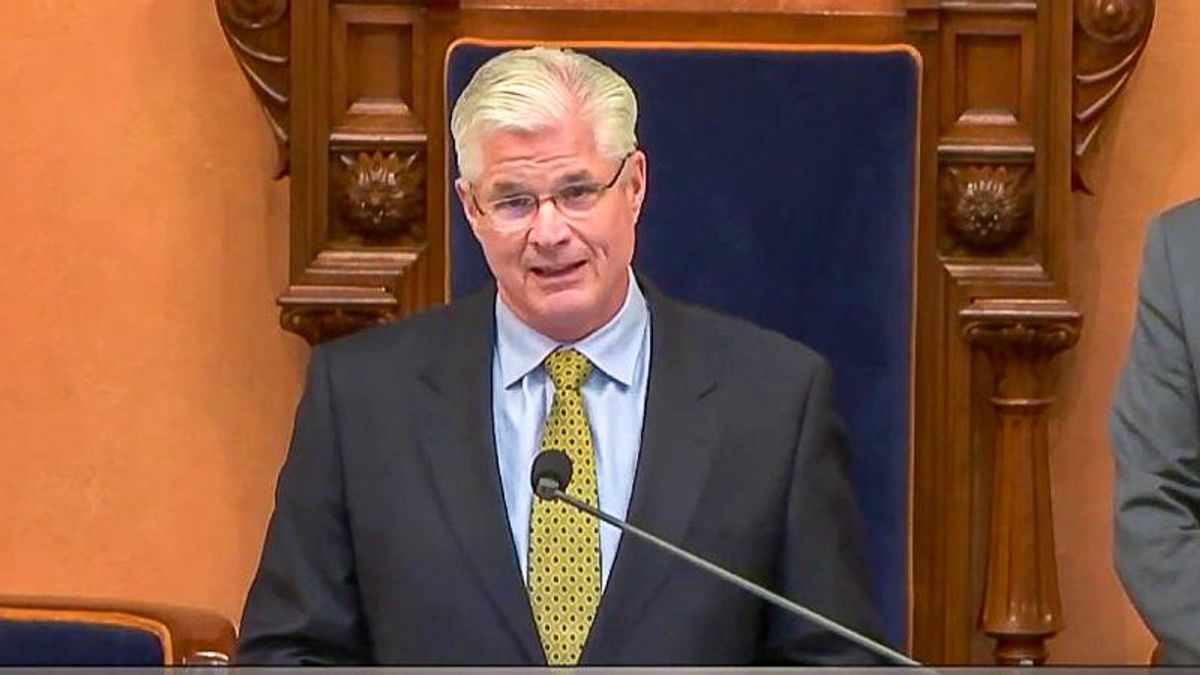‘Not a good idea:’ Experts concerned about pope trip to Iraq
By NICOLE WINFIELD and SAMYA KULLAB

1 of 10
A Christian priest holds a Vatican flag as he walks by a poster of Pope Francis during preparations for the Pope's visit in Mar Youssif Church in Baghdad, Iraq, Friday, Feb. 26, 2021. (AP/Photo/Hadi Mizban)
VATICAN CITY (AP) — Infectious disease experts are expressing concern about Pope Francis’ upcoming trip to Iraq, given a sharp rise in coronavirus infections there, a fragile health care system and the unavoidable likelihood that Iraqis will crowd to see him.
No one wants to tell Francis to call it off, and the Iraqi government has every interest in showing off its relative stability by welcoming the first pope to the birthplace of Abraham. The March 5-8 trip is expected to provide a sorely-needed spiritual boost to Iraq’s beleaguered Christians while furthering the Vatican’s bridge-building efforts with the Muslim world.
But from a purely epidemiological standpoint, as well as the public health message it sends, a papal trip to Iraq amid a global pandemic is not advisable, health experts say.
Their concerns were reinforced with the news Sunday that the Vatican ambassador to Iraq, the main point person for the trip who would have escorted Francis to all his appointments, tested positive for COVID-19 and was self-isolating.
In an email to The Associated Press, the embassy said Archbishop Mitja Leskovar’s symptoms were mild and that he was continuing to prepare for Francis’ visit.
Beyond his case, experts note that wars, economic crises and an exodus of Iraqi professionals have devastated the country’s hospital system, while studies show most of Iraq’s new COVID-19 infections are the highly-contagious variant first identified in Britain.
“I just don’t think it’s a good idea,” said Dr. Navid Madani, virologist and founding director of the Center for Science Health Education in the Middle East and North Africa at Harvard Medical School’s Dana-Farber Cancer Institute.
The Iranian-born Madani co-authored an article in The Lancet last year on the region’s uneven response to COVID-19, noting that Iraq, Syria and Yemen were poorly placed to cope, given they are still struggling with extremist insurgencies and have 40 million people who need humanitarian aid.
In a telephone interview, Madani said Middle Easterners are known for their hospitality, and cautioned that the enthusiasm among Iraqis of welcoming a peace-maker like Francis to a neglected, war-torn part of the world might lead to inadvertent violations of virus control measures.
“This could potentially lead to unsafe or superspreading risks,” she said.
Dr. Bharat Pankhania, an infectious disease control expert at the University of Exeter College of Medicine, concurred.
“It’s a perfect storm for generating lots of cases which you won’t be able to deal with,” he said.
Organizers promise to enforce mask mandates, social distancing and crowd limits, as well as the possibility of increased testing sites, two Iraqi government officials said.
The health care protocols are “critical but can be managed,” one government official told The Associated Press, speaking on condition of anonymity.
And the Vatican has taken its own precautions, with the 84-year-old pope, his 20-member Vatican entourage and the 70-plus journalists on the papal plane all vaccinated.
But the Iraqis gathering in the north, center and south of the country to attend Francis’ indoor and outdoor Masses, hear his speeches and participate in his prayer meetings are not vaccinated.
And that, scientists say, is the problem.
“We are in the middle of a global pandemic. And it is important to get the correct messages out,” Pankhania said. “The correct messages are: the less interactions with fellow human beings, the better.”
He questioned the optics of the Vatican delegation being inoculated while the Iraqis are not, and noted that Iraqis would only take such risks to go to those events because the pope was there.
In words addressed to Vatican officials and the media, he said: “You are all protected from severe disease. So if you get infected, you’re not going to die. But the people coming to see you may get infected and may die.”
“Is it wise under that circumstance for you to just turn up? And because you turn up, people turn up to see you and they get infected?” he asked.
The World Health Organization was diplomatic when asked about the wisdom of a papal trip to Iraq, saying countries should evaluate the risk of an event against the infection situation, and then decide if it should be postponed.
“It’s all about managing that risk,” said Maria Van Kerkhove, WHO’s technical lead on COVID-19. “It’s about looking at the epidemiologic situation in the country and then making sure that if that event is to take place, that it can take place as safely as possible.”
Francis has said he intends to go even if most Iraqis have to watch him on television to avoid infection. The important thing, he told Catholic News Service, is “they will see that the pope is there in their country.”
Francis has frequently called for an equitable distribution of vaccines and respect for government health measures, though he tends to not wear face masks. Francis for months has eschewed even socially distanced public audiences at the Vatican to limit the chance of contagion.
Dr. Michael Head, senior research fellow in global health at the University of Southampton’s Faculty of Medicine, said the number of new daily cases in Iraq is “increasing significantly at the moment” with the Health Ministry reporting around 4,000 a day, close to the height of its first wave in September.
Head said for any trip to Iraq, there must be infection control practices in force, including mask-wearing, hand-washing, social distancing and good ventilation in indoor spaces.
“Hopefully we will see proactive approaches to infection control in place during the pope’s visit to Baghdad,” he said.
The Iraqi government imposed a modified lockdown and curfew in mid-February amid a new surge in cases, closing schools and mosques and leaving restaurants and cafes only open for takeout. But the government decided against a full shutdown because of the difficulty of enforcing it and the financial impact on Iraq’s battered economy, the Iraqi officials told AP.
Many Iraqis remain lax in using masks and some doubt the severity of the virus.
Madani, the Harvard virologist, urged trip organizers to let science and data guide their decision-making.
A decision to reschedule or postpone the papal trip, or move it to a virtual format, would “be quite impactful from a global leadership standpoint” because “it would signal prioritizing the safety of Iraq’s public,” she said.
___
Kullab reported from Baghdad. Jamey Keaten in Geneva contributed.























